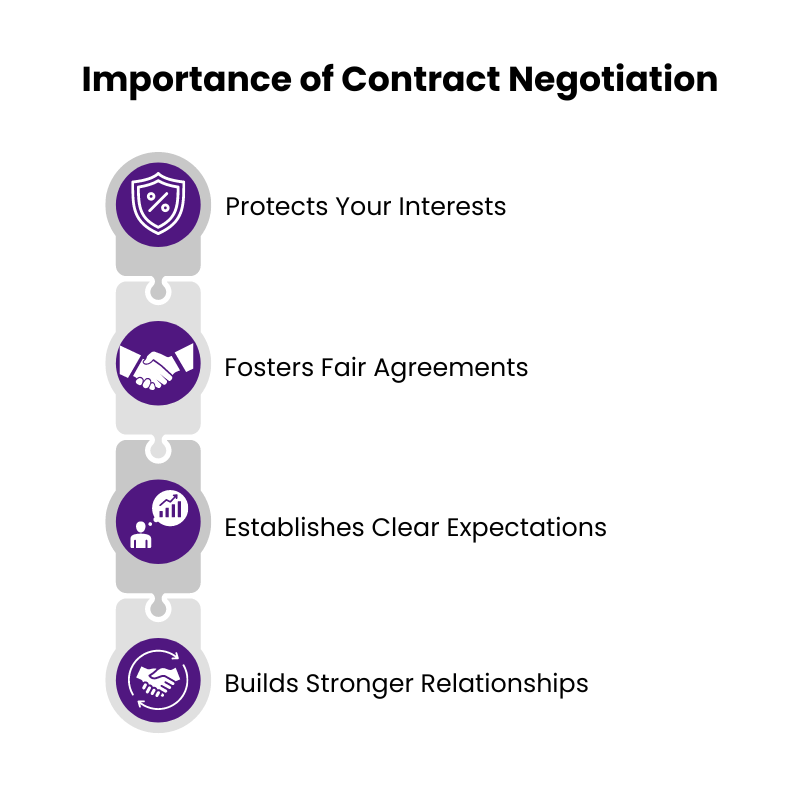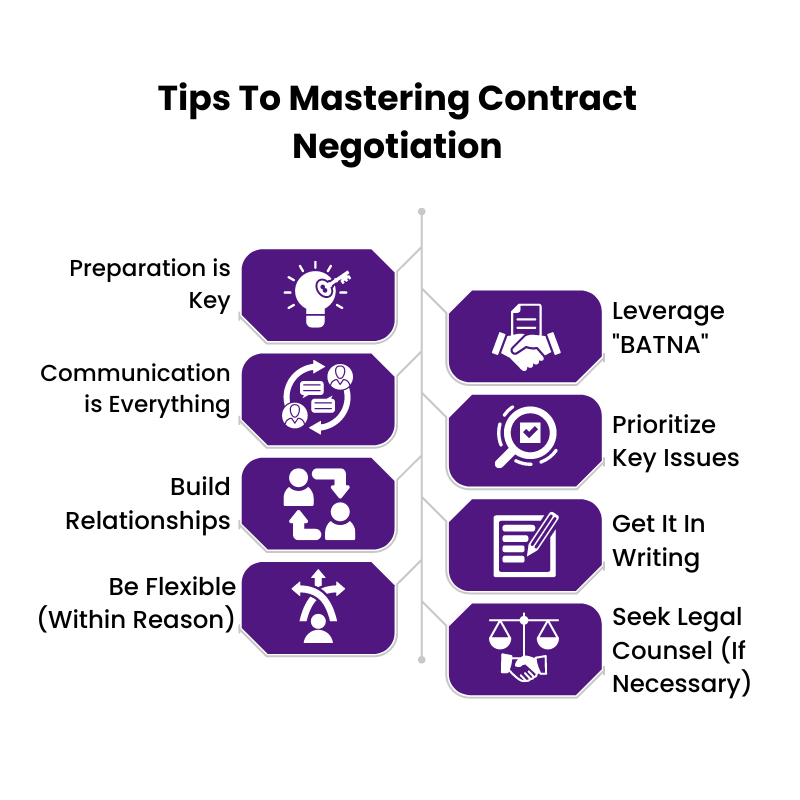Negotiating a contract can be tricky. It’s a crucial process in any business deal, directly impacting your company’s interests and trajectory. When agreements aren’t clear, both parties can face financial or legal risks down the road.
Knowing how to negotiate a contract effectively is paramount and puts you in a strong position to secure the best possible terms.
What is Contract Negotiation?
Contract negotiation is the process where two or more parties discuss and modify the terms of an agreement before signing it. The goal is to reach a mutually beneficial outcome, ensuring that all sides understand the rights, obligations, and expectations outlined in the contract.
Why is Contract Negotiation Important?

Here’s why contract negotiation matters:
- Protects Your Interests: A well-negotiated contract safeguards your business interests, minimizing potential misunderstandings and disputes down the line.
- Fosters Fair Agreements: Negotiations give you the chance to advocate for terms that are fair to both you and the other party involved.
- Establishes Clear Expectations: Negotiating a contract from the onset prevents confusion and sets clear expectations for everyone, helping avoid future conflicts.
- Builds Stronger Relationships: Effective contract negotiations prioritize finding agreements that work for both parties, promoting positive and sustainable business partnerships.
Let’s delve into some useful tips for mastering contract negotiation:

1. Preparation is Key
Never approach contract negotiations without doing your homework first. In-depth preparation means understanding:
- Your Priorities: What are you hoping to achieve? What are your non-negotiable terms, and where might you be flexible?
- The Other Party’s Needs: Research the other party to anticipate their position and potential sticking points.
- Industry Standards: Understand standard practices in your industry, as this will influence what’s considered reasonable during negotiations.
2. Communication is Everything
Open and transparent communication is vital for navigating successful contract negotiations. This means:
- Be Clear and Assertive: State your desired terms confidently, and back them up with sound reasoning.
- Listen Actively: Pay close attention to the other party’s concerns, and tailor your responses to address them thoughtfully.
- Ask for Clarification: Don’t hesitate to ask questions when needed to ensure complete understanding of the terms proposed.
3. Build Relationships
Even during a negotiation, building strong relationships can be beneficial.
- Show Respect: Maintain a courteous, professional demeanor throughout the process, fostering trust between all parties.
- Find Common Ground: Focus on areas of potential agreement early on, creating momentum, and establishing a positive rapport.
4. Be Flexible (Within Reason)
Compromise is an important part of any negotiation. Remember:
- Avoid “All or Nothing” Thinking: Strive to find win-win solutions rather than becoming fixated on specific demands.
- Don’t Be Afraid to Walk Away: Be wary of accepting terms that are significantly detrimental to your business. Always be prepared to walk away if negotiations become unreasonable.
5. Leverage “BATNA”
“BATNA” (Best Alternative to a Negotiated Agreement) is a powerful concept in negotiation. Having a strong BATNA gives you leverage.
- Know Your Alternatives: Evaluate potential alternatives if the negotiation falls through. What is your best option outside of the current deal?
- Be Prepared to Use Your BATNA: Don’t be afraid to walk away if you have a stronger alternative available, showing you mean business.
6. Prioritize Key Issues
Identify and focus on the most critical clauses in the contract. It’s better to get agreement on the core issues, even if less important points remain unresolved at first.
Here are some key contract clauses to watch:
- Scope of Work: Clearly outline the deliverables and the timeline.
- Payment Terms: Specify amount, late fees, and payment schedule.
- Termination Clauses: Define conditions for terminating the agreement.
- Warranties and Limitations of Liability: Ensure they protect your interests.
7. Get It In Writing
Negotiations are often fluid, and it’s easy for understandings to change over time. Ensure all essential points are in writing.
- Document Agreed-Upon Points: Don’t just rely on verbal agreements. Document key changes or modifications to the contract throughout the negotiation process.
- Memorialize the Final Agreement: It’s a must-have to have the final, agreed-upon contract in writing, with all authorized parties’ signatures.
[Related Read: Contract Management Security]
8. Seek Legal Counsel (If Necessary)
Complex contracts may require the expertise of someone specializing in contract law.
- Don’t Hesitate to Consult: Seek legal guidance when dealing with high-stakes contracts or clauses with intricate language and implications.
- Secure Your Interests: Ensure the final contract language accurately reflects the negotiated terms and protects your interests.
Mastering the art of contract negotiation takes practice and careful strategy.
By applying these tips, you can improve your ability to negotiate a contract and secure favorable terms that benefit your business in the long run.




